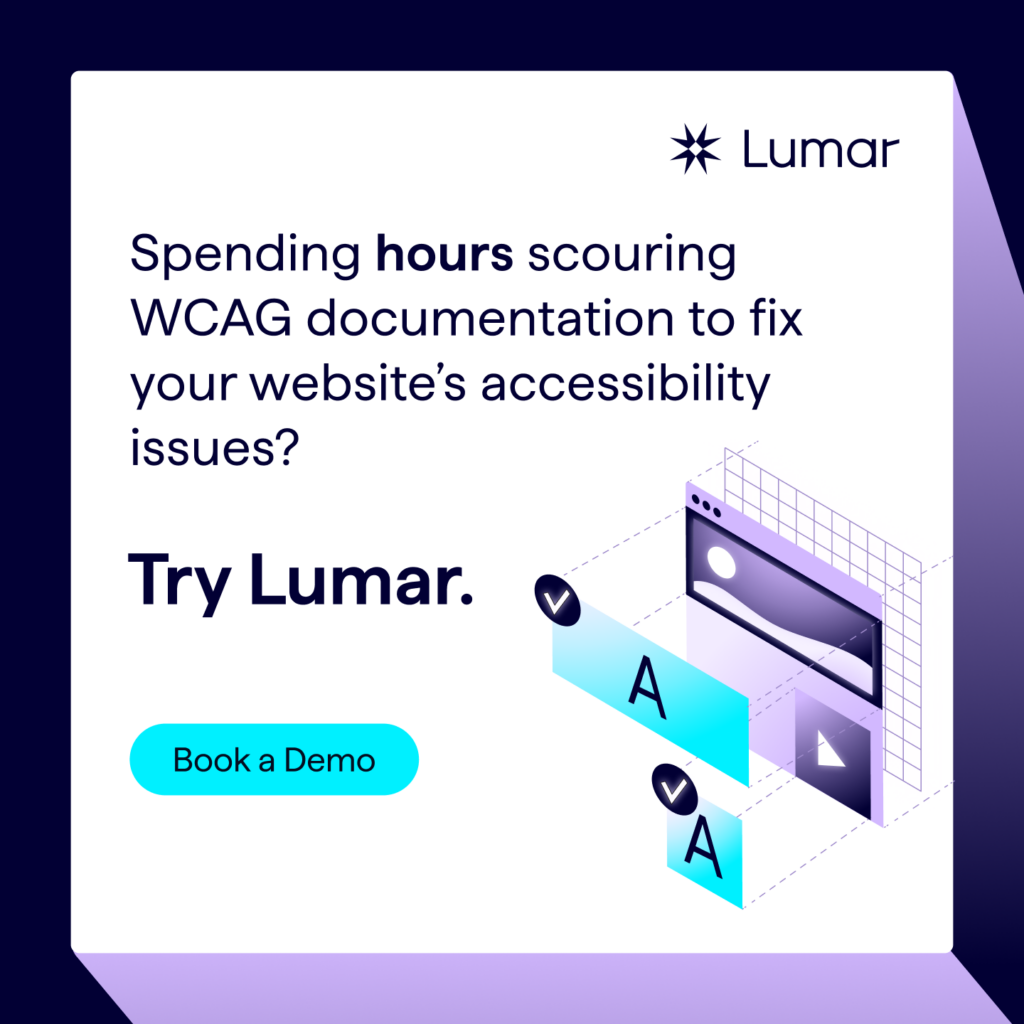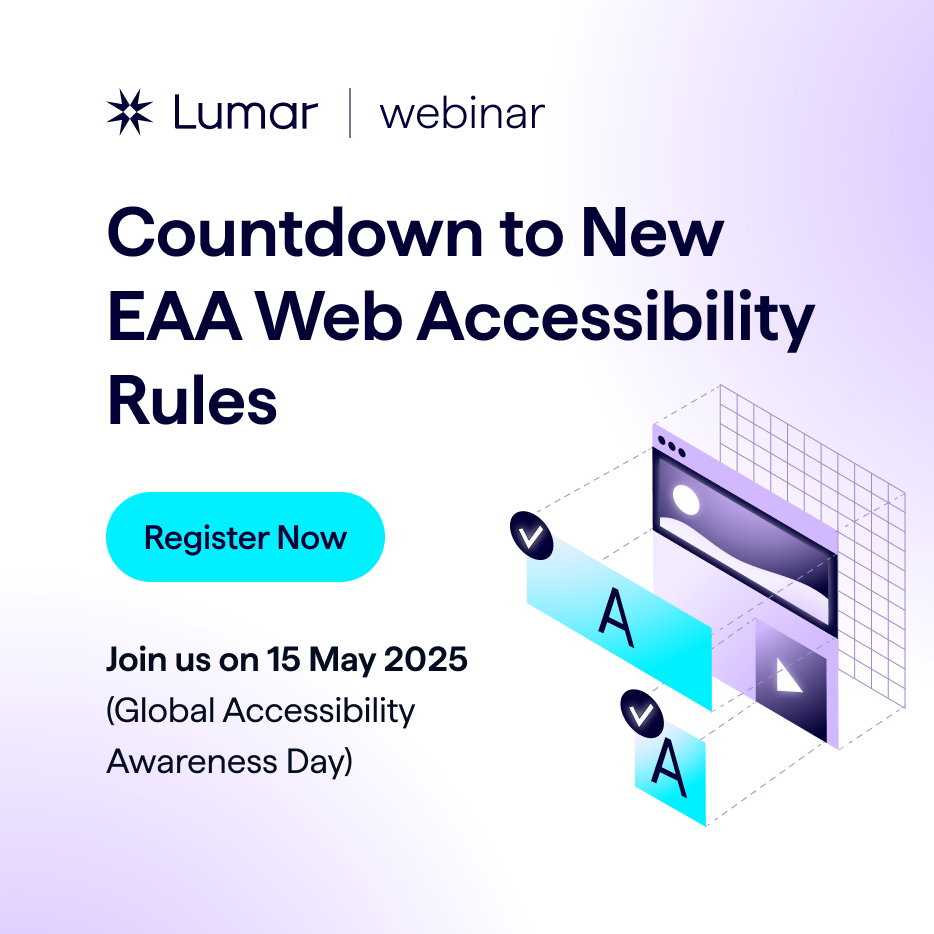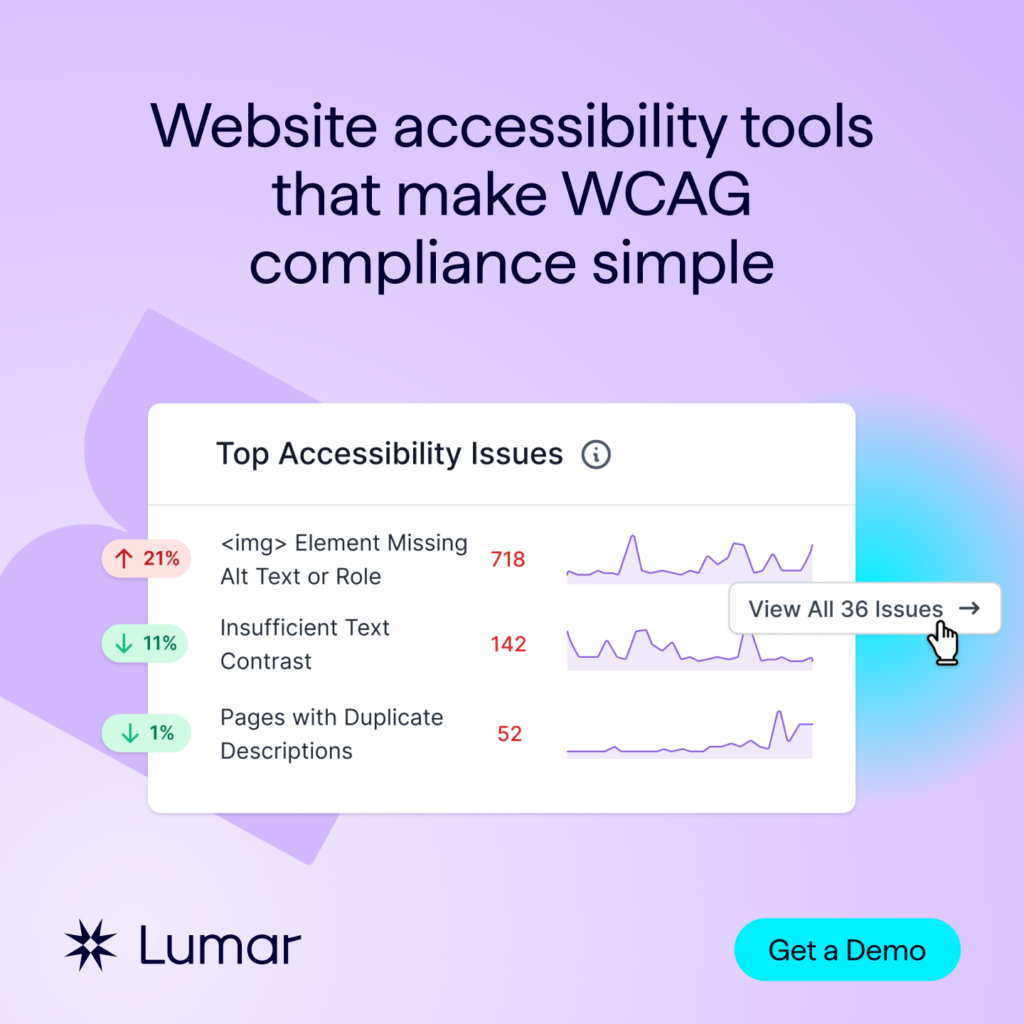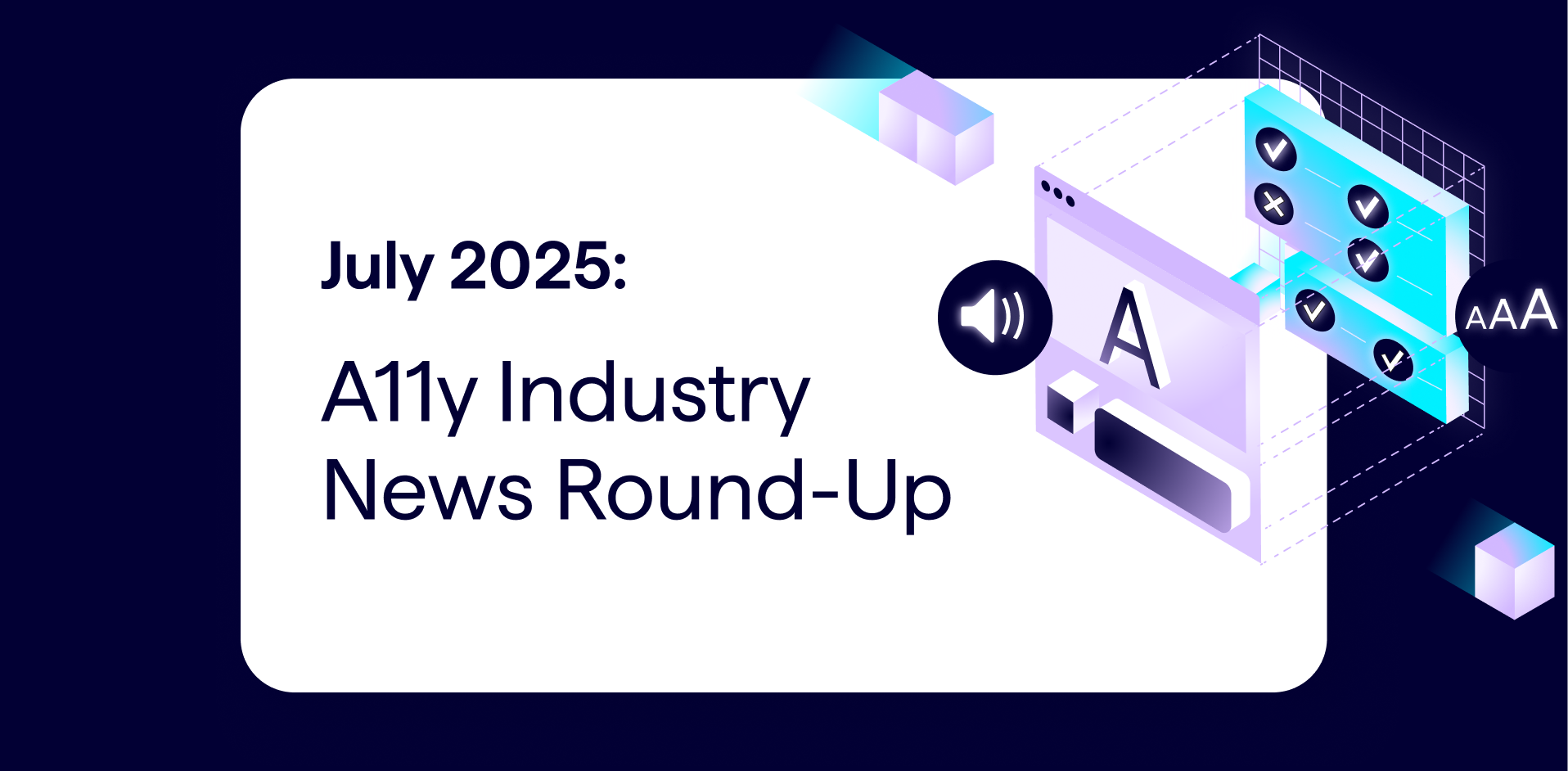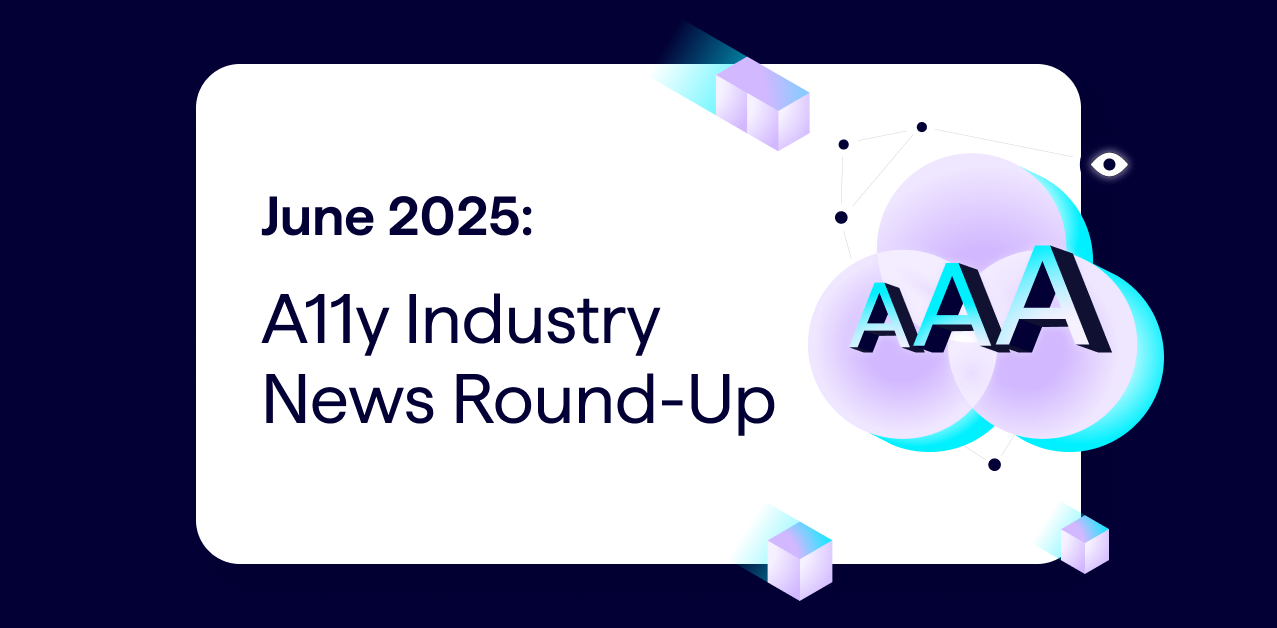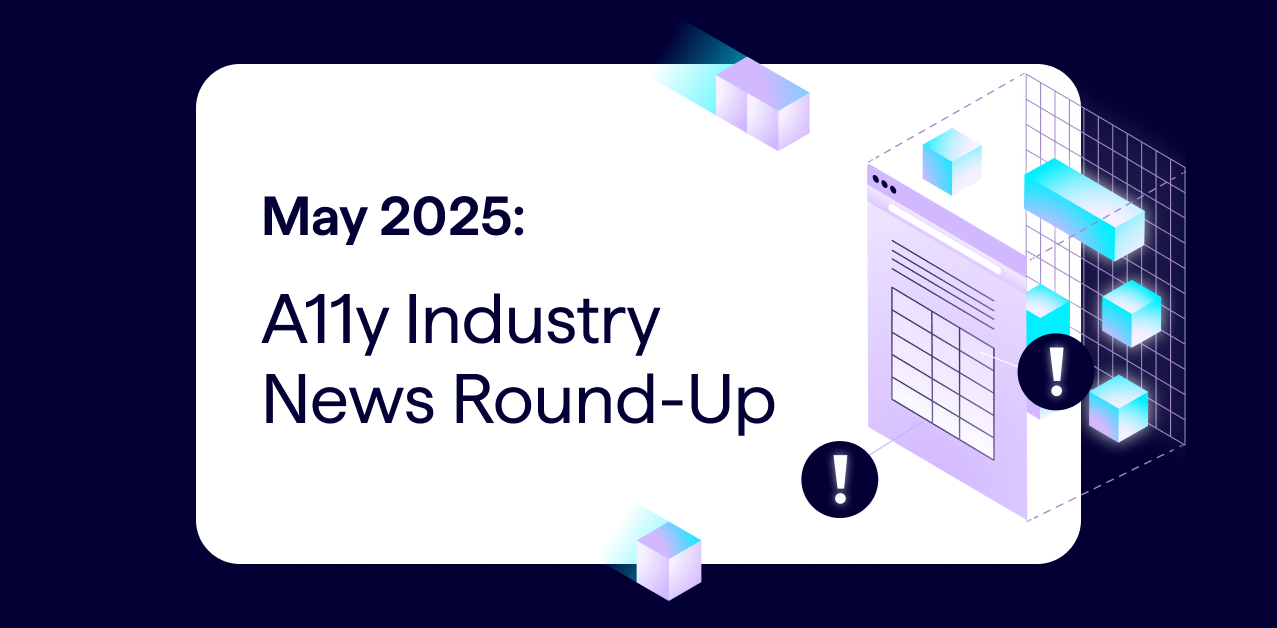What happened in digital accessibility news this month?
Each month, the Lumar team rounds up some of the top headlines for website managers and web accessibility professionals.
For our April 2025 a11y news roundup, headlines include:
- One month to go until the new European Accessibility Act (EAA) goes into effect for companies doing business in Europe
- One year to go until US public agency websites (including public college and university sites) must comply with updated web content accessibility standards
- Global Accessibility Awareness Day (GAAD) is on May 15, 2025 – we provide a list of virtual events to take part in (including our own upcoming GAAD webinar!)
- Global digital accessibility salary survey results are now available — Full-time respondents reported an average salary of $109,542 USD, though average salaries varied by country.
- Major video game developers including Ninendo, Microsoft, and Ubisoft, have now signed on to the “Accessible Games Initiative”
- Global inconsistencies in WCAG adoption highlight the need for regional a11y regulation awareness
- … and more!
Read on for the top digital accessibility news stories this month.
One month to go until the European Accessibility Act (EAA) goes into effect
On June 28, 2025, the European Accessibility Act (EAA) becomes enforceable in all EU member states. It applies to any organization that serves EU-based consumers, not only to EU-based businesses.
Per the European Commission page on the EAA: “The European accessibility act is a directive that aims to improve the functioning of the internal market for accessible products and services, by removing barriers created by divergent rules in Member States.”
Despite the looming EAA deadline, 75% of European companies may be at risk of fines as they do not yet meet the accessibility standards required by EAA (according to Storyblok research that we covered last month). Furthermore, a shocking 18.5% of companies surveyed said they were not aware of the upcoming EAA requirements at all.
We’ve covered how to prepare your website for the European Accessibility Act in depth — it’s well worth a read if your firm does business in the EU.
We’re also hosting a dedicated EAA website accessibility webinar on May 15 — register here and bring your questions for our a11y expert guests to ensure you’re prepared for the new digital accessibility rules.
(Sources: MarTech Cube, Lumar EAA Website Compliance Guide)
Global Accessibility Awareness Day (GAAD) events to check out in May 2025
Global Accessibility Awareness Day (GAAD) is on May 15, 2025. In addition to Lumar’s own GAAD webinar on May 15, this year focused on EAA compliance, here are even more virtual events to check out on and around Global Accessibility Awareness Day:
- (Webinar) Beyond the Visible: The Continuum of Disabilities and Today’s Assistive Tech (hosted by the University of Chicago’s Center for Digital Accessibility) – May 14, 2025
- (Webinar) Get Your Website Ready for the June 2025 European Accessibility Act (hosted by Lumar) – May 15, 2025
- (Webinar) AI and Accessibility: Navigating The Challenges, Exploring The Potential (hosted by Transmedia Catalonia’s AccessTalks) — May 15, 2025
- (Webinar) An Introduction to Assistive Technology (hosted by Workday) – May 15, 2025
- (Webinar) Digital Inclusion And Accessibility: Leaving No One Behind In Virtual Worlds And The Citiverse (hosted by the International Telecommunication Union [ITU]) – May 15, 2025
- (Webinar) The State of Accessibility and Innovation in Asia-Pacific & The Vision of SEED Inclusivity (hosted by Seedstars) – May 15, 2025
- (Webinar) Ask the Expert: Images and Accessibility (hosted by Foundazione LIA) – May 20, 2025
- (Webinar) AI and Accessible Publishing (hosted by the DAISY Consortium) – May 28, 2025
- (Webinar) Leveraging AI for Accessible and Inclusive Learning: Practical Strategies for Diverse Learners (hosted by Online Learning Consortium) – May 28, 2025
More GAAD events for 2025 can be found on the official Global Accessibility Awareness Day website.
One year to go until US public agency websites, including public college and university sites, must comply with updated ADA accessibility requirements
By April 24, 2026, US public agencies — including public colleges and universities — will be required to revise millions of web pages to comply with updated digital accessibility standards set by the DOJ. The mandate specifies that all digital content must meet WCAG 2.1 Level AA standards by next year.
Per the University of Minnesota’s website post on the topic, the new requirements are based on “Title II of the Americans with Disabilities Act (ADA), requiring public entities, including colleges and universities, to ensure all digital content complies with Web Content Accessibility Guidelines (WCAG) 2.1 AA standards. This applies to websites, apps, course materials, social media, and other digital content, ensuring accessibility for people with disabilities.”
For more information, see the ADA fact sheet on the upcoming web content and mobile app accessibility requirements.
(Source: eCampus News, University of Minnesota, and ADA Fact Sheet)
11 ADA guidelines were removed from ADA.gov last month
Last month, the US Department of Justice (DOJ) removed 11 guidelines for US businesses on compliance with the Americans with Disabilities Act (ADA), per reporting from The Guardian. Some of the now-removed guidelines were related to COVID-19 protocols that the DOJ claimed in a press release were “outdated” and being removed to “streamline Americans with Disabilities Act (ADA) compliance resources for American businesses.”
The press release states: “Today’s withdrawal of 11 pieces of unnecessary and outdated guidance will aid businesses in complying with the ADA by eliminating unnecessary review and focusing only on current ADA guidance.”
Other guidelines removed last month related to broader accessibility requirements for businesses, including the removal of the following pieces of guidance:
- Expanding Your Market: Maintaining Accessible Features in Retail Establishments (2009)
- Expanding Your Market: Gathering Input from Customers with Disabilities (2007)
- Expanding Your Market: Accessible Customer Service Practices for Hotel and Lodging Guests with Disabilities (2006)
- Reaching out to Customers with Disabilities (2005)
- Americans with Disabilities Act: Assistance at Self-Serve Gas Stations (1999)
- Five Steps to Make New Lodging Facilities Comply with the ADA (1999)
Per The Guardian: “Updates have already been made to the ADA.gov website to reflect the removal of the guidances. Multiple pages were removed from the ADA’s archive website, including one page that explained how retail businesses are required to have accessible features and another on customer service practices for hotel and lodging guests with disabilities.”
(Source: The Guardian)
Global digital accessibility salary survey results are now available
The results of WebAIM’s Global Digital Accessibility Salary Survey, conducted with the GAAD Foundation at the end of 2024 are now available. The salary survey gathered insights from 656 professionals working in digital accessibility roles.
Full-time respondents reported an average salary of $109,542 USD (median $96,100), though average salaries varied by country. Those working remotely or in hybrid settings generally earned more than their in-office counterparts. Notably, 57.6% of respondents working in digital accessibility identified as having a disability themselves, and blind respondents had the highest average salaries among disability groups.
(Source: WebAIM and GAAD Foundation)
Major video game companies are joining the “Accessible Games Initiative”
Major video game companies, including Nintendo, Microsoft, and Ubisoft, have joined the “Accessible Games Initiative” led by the Entertainment Software Association. These video game companies will now share accessibility labels about their games. This effort aims to improve the communication of accessibility features in games by using specific tags, such as “large and clear subtitles” and “narrated menus”, on digital storefronts.
(Source: The Verge)
Microsoft Ability Summit 2025 highlights AI and accessibility innovations
At last month’s 2025 Microsoft Ability Summit, held on March 18, the company showcased its ongoing efforts at the intersection of AI and accessibility. This was the 15th annual Microsoft Ability Summit, with over 20,000 attendees from 164 countries coming together virtually to discuss the future of accessibility.
Key announcements included the launch of the Xbox Adaptive Joystick, a comprehensive guide for accessible packaging, and upgrades to Microsoft Teams’ Sign Language View. Microsoft also discussed how GitHub Copilot aids developers in creating more accessible code and shared updates on the Narrator tool, which will feature AI-powered image descriptions. Additionally, a speech recognition project from the University of Illinois Urbana-Champaign helped improve Windows Speech Recognition by up to 60% for non-standard speech patterns.
(Source: Microsoft Blog)
Ready to improve accessibility on your own website?
Get a demo of Lumar’s web accessibility platform and start on your journey toward a more accessible, WCAG-compliant online experience.


